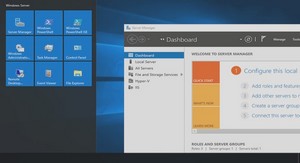……..
Benefits of IPv6
Benefits of IPv6 include:
• Large address space
• Hierarchical addressing and routing infrastructure
• Stateless and Stateful address configuration
• Built-in security
• Enhanced support for prioritized delivery
• New protocol for neighboring node interaction
• Extensibility
IPv6 Implementations Using Microsoft Technologies
• Windows Server 2003 family
• The IPv6 protocol for Windows XP SP1 and Windows XP SP2
• The IPv6 protocol for Windows CE .NET versions 4.1 and later
• The Next Generation TCP/IP stack in Windows Vista and Windows Server 2008
The IPv6 Address Space Address Syntax:
• 128-bit address in binary:
• 128-bit address divided into 16-bit boundaries:
• Each 16-bit block converted to HEX (base 16):
• Further simplify by removing leading zeros:
001000000000000100001101101110000000
0000000000000010111100111011
000000101010101000000000111111111111
1110001010001001110001011010
0010000000000001 0000110110111000
0000000000000000 0010111100111011
0000001010101010 0000000011111111
1111111000101000 1001110001011010
2001:0DB8:0000:2F3B:02AA:00FF:FE28:9C5A
2001:DB8:0:2F3B:2AA:FF:FE28:9C5A
Unicast IPv6 Address Types
• Global unicast addresses
• Link-local addresses
• Site-local addresses
• Unique local IPv6 unicast addresses
• Special addresses
IPv6 Addresses Assigned to Hosts and Routers
IPv6 hosts and routers are typically assigned the following IP addresses:
• A link-local address for each interface
• Additional unicast addresses for each interface (can be a site-local and one or multiple global addresses)
• The loopback address (::1)
Routers also are assigned an anycast address for each subnet
Zone IDs
• fe80::2b0:d0ff:fee9:4143%3
• fec0::f282:2b0:d0ff:fee9:4143%2
IPv4 and IPv6 Coexistence
Methods for providing coexistence of IPv4 and IPv6:
• Dual IP layer architecture
(Windows Vista and Windows Server 2008)
• Dual stack architecture
(Windows Server 2003 and Windows XP)
• DNS Infrastructure requirements
• IPv6 over IPv4 tunneling
How Does DNS Support IPv6?
DNS support for IPv6:
• DNS Host records are classified as AAAA records
• Pointer Records are configured in the IP6.ARPA zone
• DNS tries to return the appropriate address
(either IP 4 or IP 6 depending on the Address Selection rules)
Demonstration: Configuring DNS to Support IPv6
In this demonstration, you will see how to:
• Configure an AAAA record
• Create and IPv6 PTR record (IP6.ARPA)



